22 Sep 2016 | Awards, Fellowship, Fellowship 2016, Middle East and North Africa, mobile, News, Yemen
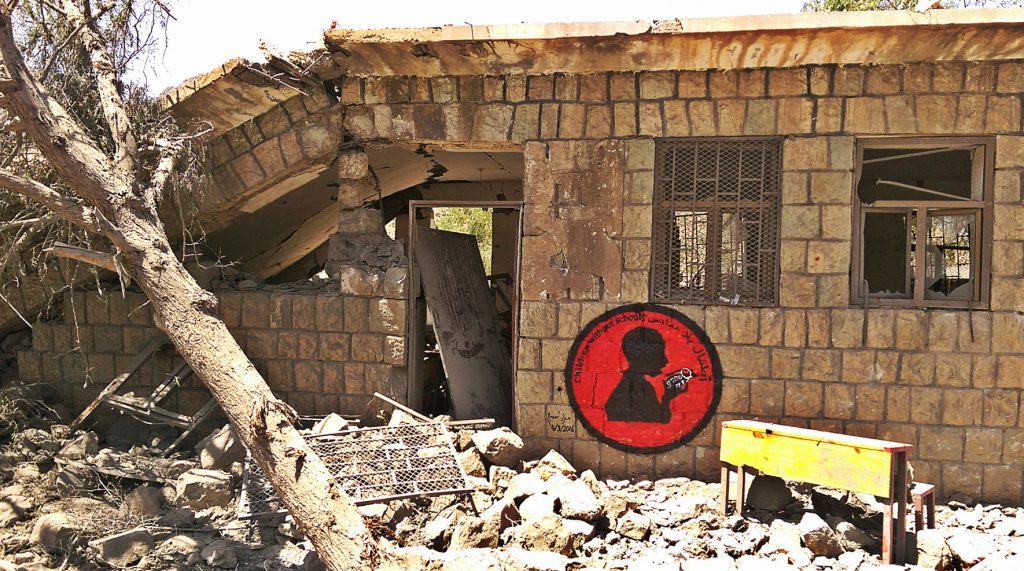
Credit: Ruins campaign. Bani Waleed, September 2016
On 3 September 2016, a group of Houthi rebels convened a meeting at al-Najah School in the al-Haima district of Bani Waleed, a local witness told Murad Subay, street artist and winner of the 2016 Index on Censorship award for arts, that the men entered the school without permission.
“We are not with any of the warring parties – we are caught in the middle,” the witness said.
Soon after, the school was destroyed in an airstrike carried out by the Saudi Arabian-led military coalition, killing one disabled student and adding 1,200 to the more than 3.4 million already forced out of education in the country as over 3,600 schools have been forced to close in the course of the war.
“Can you imagine? These are the soldiers of the wars to come,” Subay told Index. “Without education, these children could become tomorrow’s fighters and tools in the hands of extremists.”
At dawn on 4 September Subay travelled to Bani Waleed to create a mural on what remained of al-Najah.
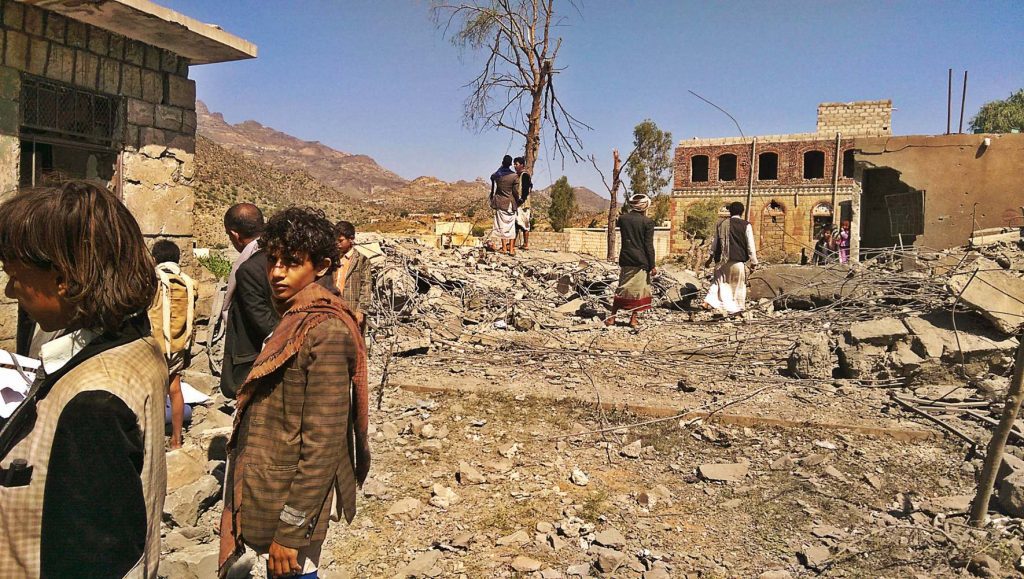
Credit: Ruins campaign. Bani Waleed, September 2016
“When we got there I asked some of the students what they were going to do now that their school was destroyed and some told me they will go to Sanaa while others said they will travel to surrounding villages,” Subay said. “But it will be much more difficult for the 400 girls who attended the school because traditions in Yemen mean they will not be able to travel alone, making it impossible for them to go to other villages to study.”
|
Murad Subay is the 2016 Index on Censorship Freedom of Expression Arts Award-winner and fellow. His practice involves Yemenis in creating murals that protest the country’s civil war. Read more about Subay’s work.
|
|
Destroying schools isn’t a big deal for the warring parties, the artist added. “Some of the children of those leaders who shout ‘death to America’ are studying at the best universities in the world, including in the USA, while each bombed school in Yemen – especially big ones like al-Haima – will take years to rebuild.”
The situation is made even more difficult in a time of war when resources and building materials are almost impossible to come by. “Even if the West stopped supplying weapons to Saudi Arabia today and patted themselves on the back saying ‘we are doing good’, Saudi Arabia already has enough to wage wars for another 150 years if it wants.”
If there is any hope for peace to prevail and schools, hospitals and other buildings belonging to the people are to be rebuilt, countries like Britain and America should take a step further and tell Saudi Arabia “to show restraint”, Subay said.
“While Saudi Arabia is doing the majority of the destruction, all sides of the war in Yemen must take responsibility.”
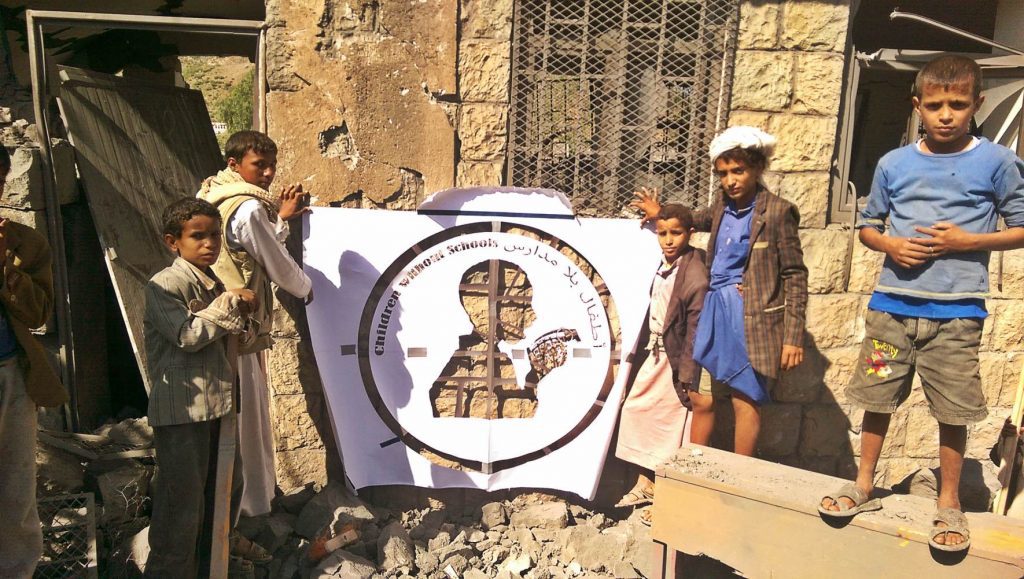
Credit: Ruins campaign. Bani Waleed, September 2016
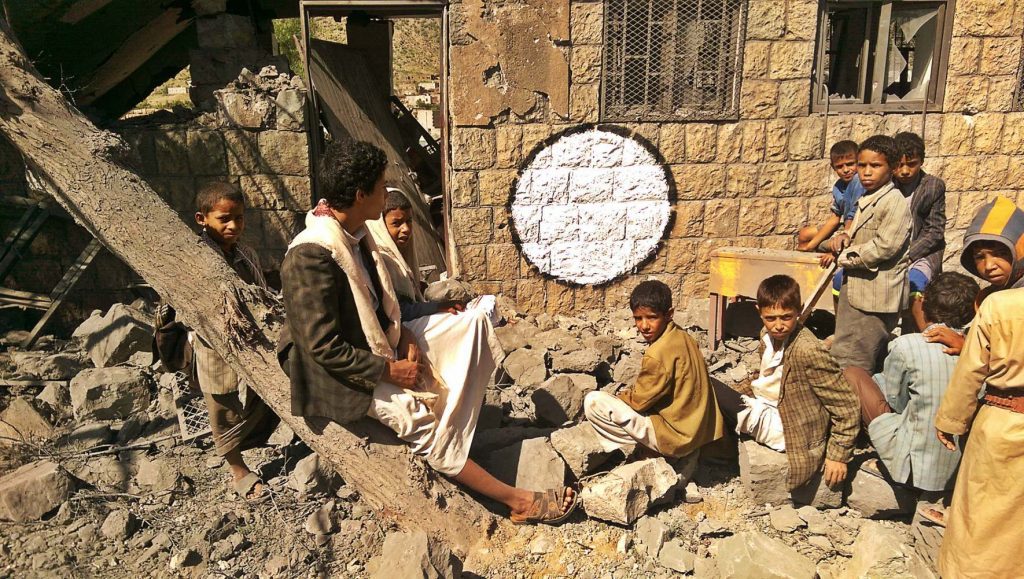
Credit: Ruins campaign. Bani Waleed, September 2016
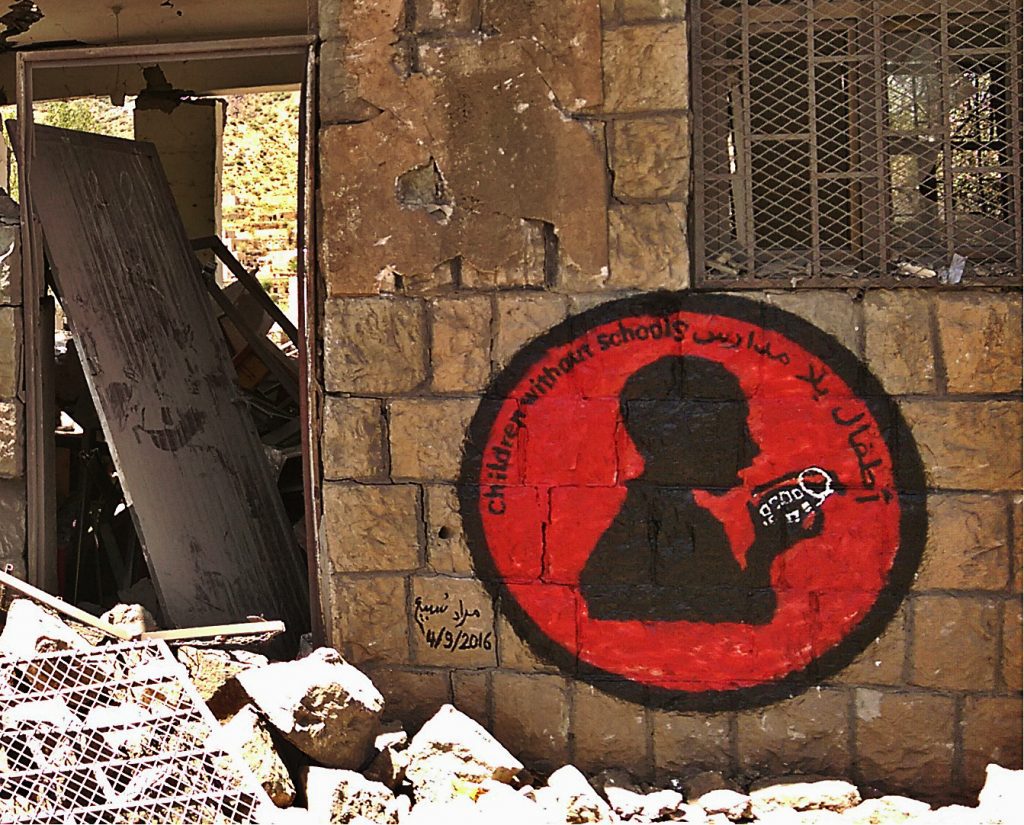
Credit: Ruins campaign. Bani Waleed, September 2016
The mural completed on 4 September depicts a child holding a hand grenade in place of a book, with the words “Children without schools” painted in English and Arabic.
When painting with fellow artists from the Ruins campaign – set up in May 2015 in collaboration with fellow artist Thi Yazen to paint on the walls of buildings damaged by the war – on 25 August, the group were arrested and interrogated by a local militia.
“They asked us to sign a letter with our fingerprints promising that we would not return again without permission,” Subay explains. “I actually did have permission from a local tribal leader but they wouldn’t listen.”
The artists were told if they returned they would be punished.
“My friends were very afraid and some of them said even with permission they would not return,” Subay said. “It was a strange situation for them.”
Subway himself isn’t put off and is already looking forward the next Ruins campaign, wherever that may be.
The last time he spoke with Index, Ruins had just completed a series of murals in front of the Central Bank of Yemen to represent the country’s economic collapse. Soon after the murals were finished, Houthi rebels defaced two out of the three works of art, writing “Samidoon” (صامدون), meaning “steadfast”, which is one of their slogans.
Assessing the situation in Yemen and the many different sides of the conflict, Subay said: “It is very difficult. Every night we hear airstrikes here and there, but we go on with our lives.”
“But any day when I can paint is a good one.”
Nominations are now open for 2017 Index on Censorship Freedom of Expression Awards and will remain open until 11 October. You can make yours here.
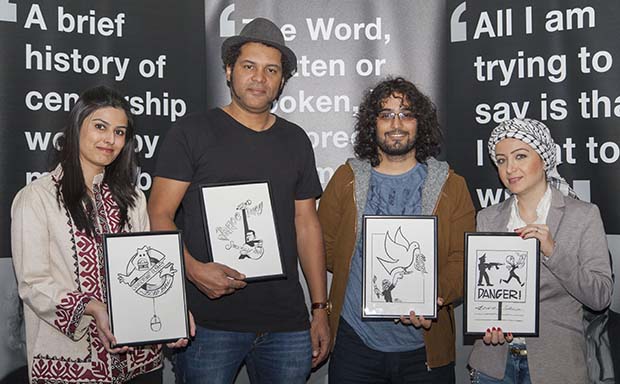
Winners of the 2016 Freedom of Expression Awards: from left, Farieha Aziz of Bolo Bhi (campaigning), Serge Bambara — aka “Smockey” (Music in Exile), Murad Subay (arts), Zaina Erhaim (journalism). GreatFire (digital activism), not pictured, is an anonymous collective. Photo: Sean Gallagher for Index on Censorship
Ryan McChrystal is the assistant online editor at Index on Censorship
17 Jun 2016 | Middle East and North Africa, mobile, News, Saudi Arabia
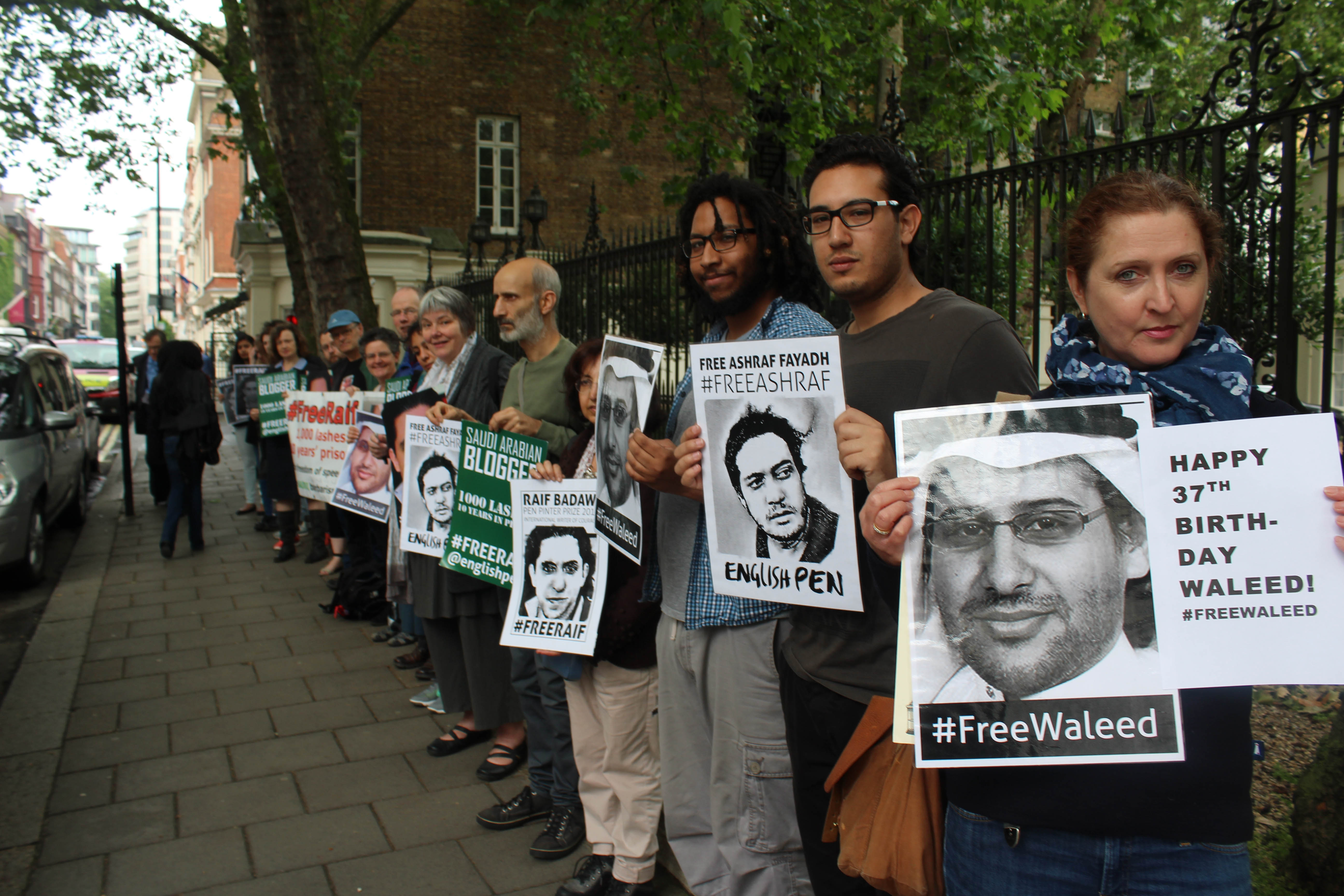
Credit: Cat Lucas, English PEN
Index on Censorship joined English Pen and several other organisations on Friday outside the Saudi Arabian embassy in London to call for the immediate release of Raif Badawi. The Saudi blogger was arrested four years ago on 17 June 2012. He was subsequently sentenced to 10 years in prison and 1,000 lashes for creating the website Free Saudi Liberals and “insulting Islam through electronic channels”.
Badawi received his first 50 lashes in the port city of Jeddah on Friday 9 January, after which the world took notice. The attention has been invaluable in delaying the remainder of his lashing, which his wife Ensaf Haidar says he won’t be able to survive.
Ahead of the demonstration, English Pen and the Raif Badawi Foundation for Freedom have been asking his supporters around the world to take action, including sharing a photo of themselves holding a poster of Raif or a message of solidarity.
It is crucial that we continue to take a stand against the Saudi government’s treatment of Raif Badawi. Index spoke with several of the protesters in London.
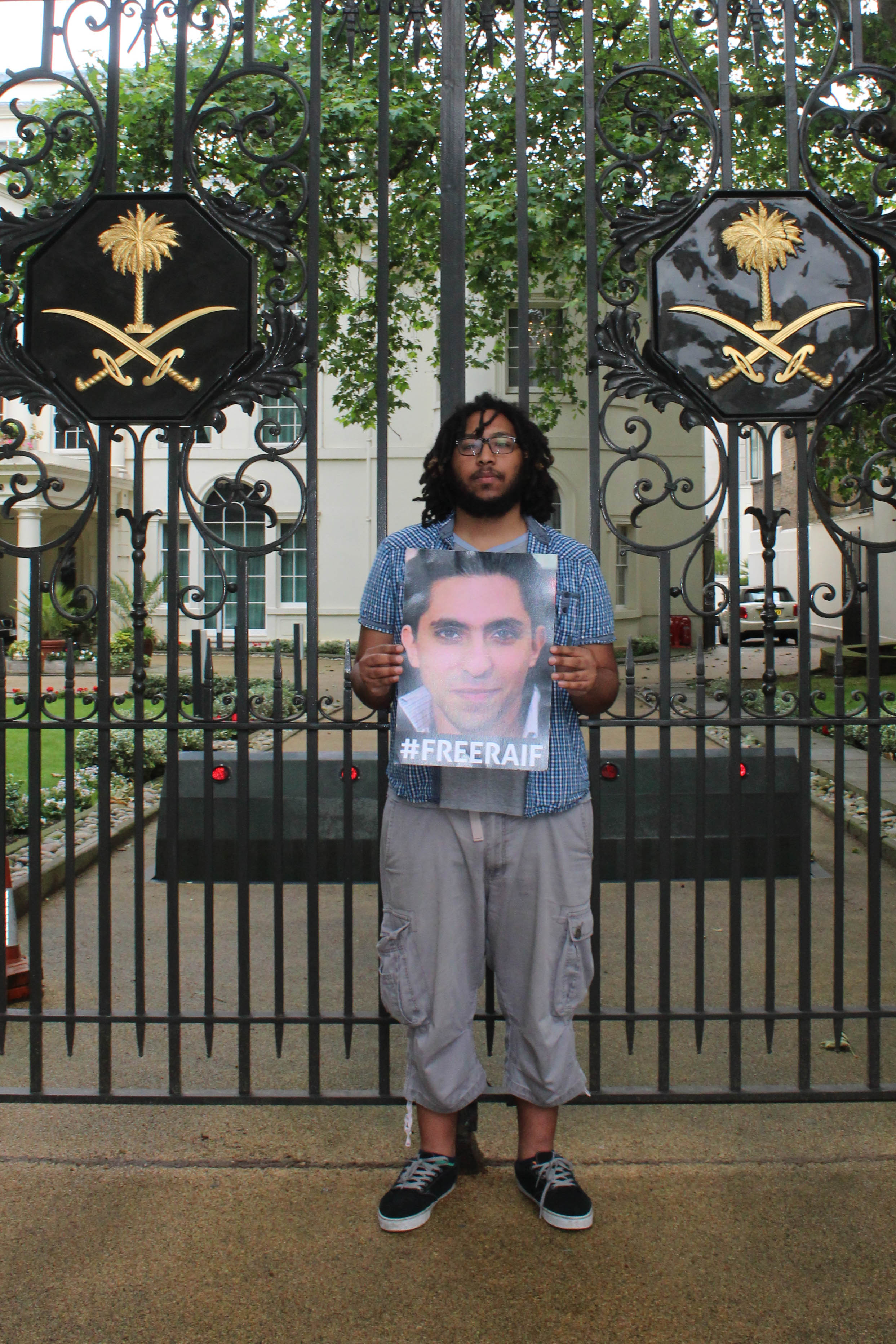
Credit: Cat Lucas, English Pen
Imad Iddine Habib, spokesperson of the Council of Ex-Muslims of Britain
“I come from Western Sahara and I’m here today because I knew Raif Badawi through his writings, have been to his websites and I know his family. This campaign is very close to my heart. Raif is in prison for writing and offering a space for a lot of Saudis that don’t fall in line with the thinking of the regime and the conservatives. I would hope to see more and more people stepping up to call out Saudi Arabia and the oppressive and anti-human rights laws they are implementing. Increasingly these laws are used against atheists and free thinkers, who are being judged as terrorists.”
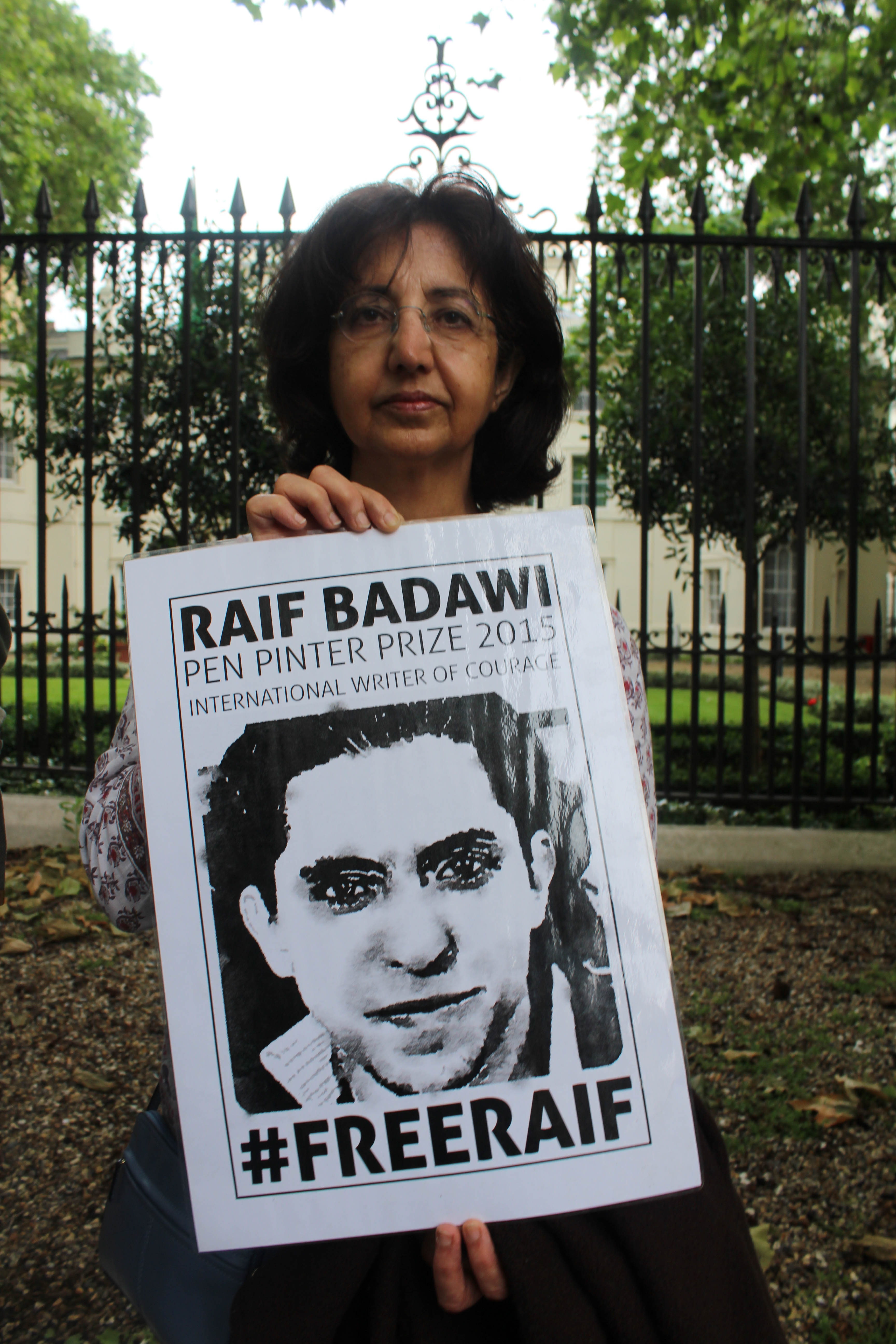
Credit: Cat Lucas, English Pen
Ravinder Randhawa, novelist
“As a writer, I feel that freedom of expression is the most important freedom that humanity has. In all societies, dialogue and discourse are the manners in which we examine ourselves and move forward. Raif was doing precisely that. He was encouraging dialogue and debate which was peaceful and non-harmful, and his punishment is unjustified and barbaric. Raif is a great person for speaking out regardless of the consequences. I’m here to support his cause and the cause of many other writers who are imprisoned. I’m here as a writer in solidarity with another writer.”
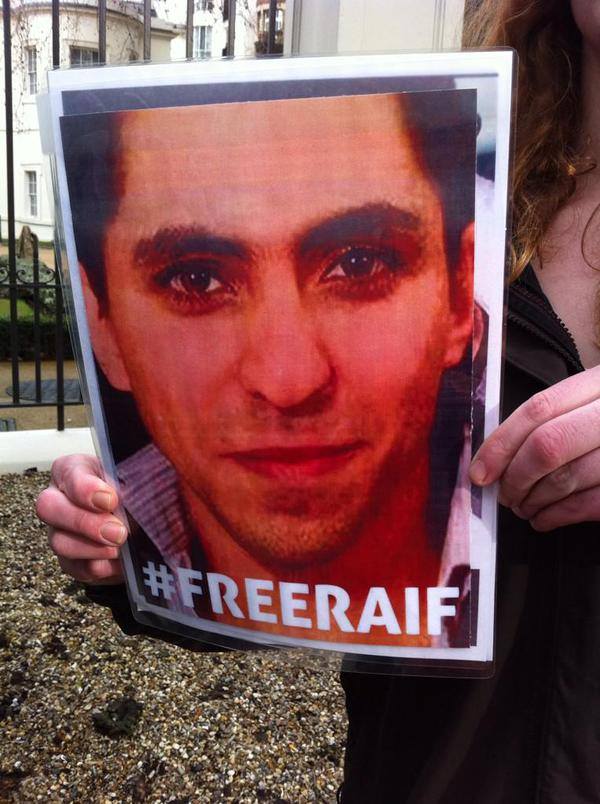
Credit: Cat Lucas, English Pen
Cat Lucas, English Pen
“Unfortunately, here we are outside the Saudi embassy – again. We’ve been coming here for 18 months in support of imprisoned blogger Raif Badawi, firstly with 20 consecutive weekly protests following his lashing, and now we protest here monthly. Today not only marks the fourth anniversary of Raif’s arrest but his lawyer Waleed Abulkhair’s 37th birthday. Waleed is serving a 15-year sentence. We are here to continue to call on the authorities to release them both, which is now more important than ever as we have learned this week that both have been hospitalised following a hunger strike. We know these protests are a really big deal for them.”
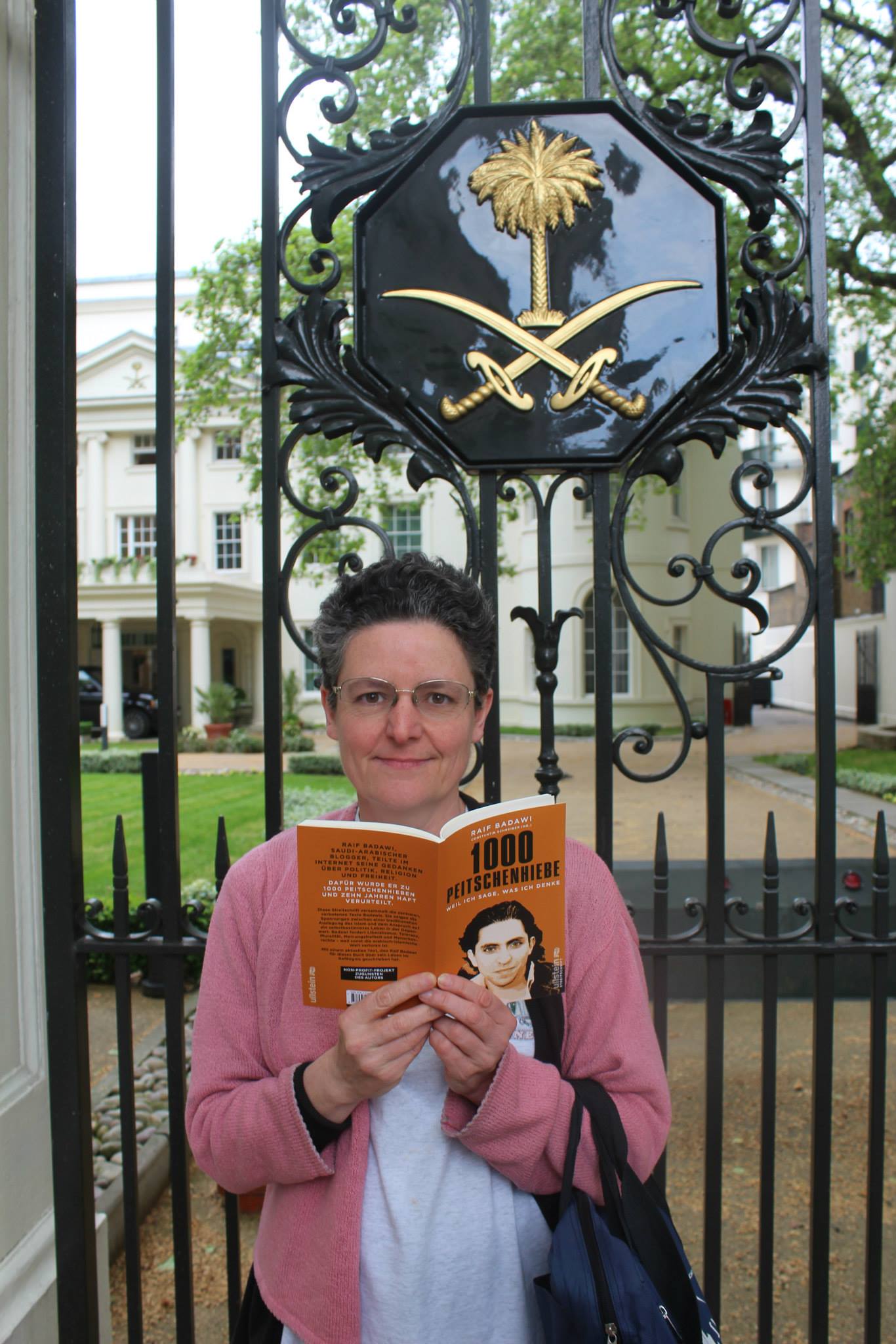
Credit: Cat Lucas, English Pen
Susan Dorrell, Activist
“I come here quite frequently — I’m one of the regulars. It’s very important to stand up for freedom of expression and Raif symbolises thousands of people across the world who suffers persecution as a result of expressing a peaceful opinion. He’s a victim of religious-led persecution and anyone who believes in free speech should support him.”
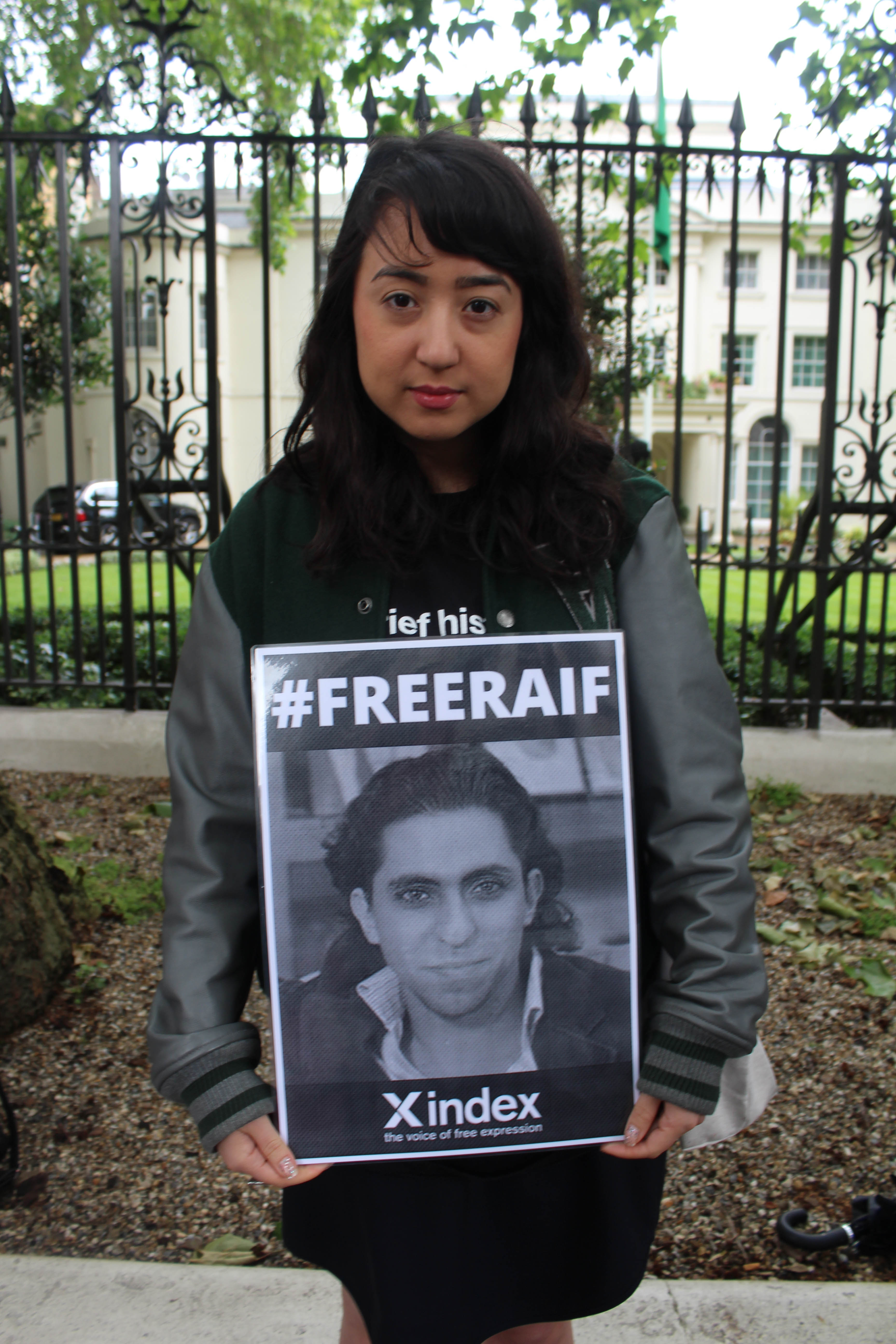
Credit: Cat Lucas, English Pen
Hannah Machlin, Project Officer, Index on Censorship
“We are here in solidarity with Raif. Index on Censorship is particularly concerned with his public lashings, the second set of which has been delayed due to his health problems. If the Saudi government conducts the rest of his lashings in private, as they said they will, there are much more opportunities for abuse. He may not survive and this is why we must not turn a blind eye.”
14 Apr 2016 | Asia and Pacific, Burma, China, Eritrea, Europe and Central Asia, Iran, Middle East and North Africa, mobile, News, North Korea, Saudi Arabia, Sudan, Turkmenistan, Uzbekistan
[vc_row][vc_column][vc_column_text]
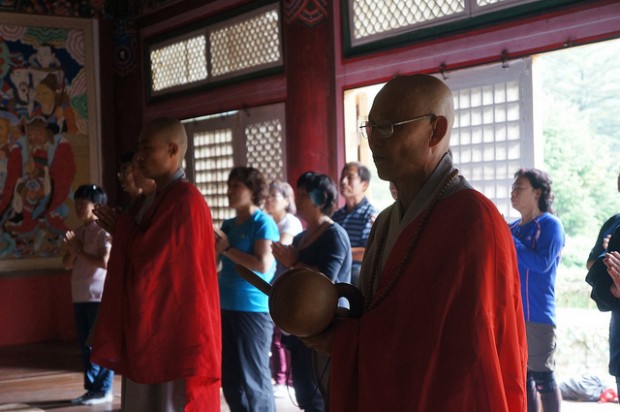
Pohyon Temple in the Myohyang mountains, once a national center for Korean Buddhism. Credit: Uri Tours / Flickr
After the United States Commission on International Religious Freedom, an independent organisation created by the US Congress to evaluate religious freedom conditions around the world, released its 2015 report, it became clear that an insufficient amount of progress had been made since Index on Censorship last reported on the issue.
Here’s a roundup of some the most appalling religious freedom violations from across the globe.
Burma
Bigotry and intolerance continue to scorch the lives of religious and ethnic minorities in Burma, particularly Rohingya Muslims. The Burmese government demonstrated little effort toward intervening or properly investigating claims of abuse, including those carried out by religious figures in the Buddhist community. As internet availability spread throughout the country, social media played a role in promoting a platform of hate and proposed violence against minority populations. Rohingya Muslims in the country face a unique level of discrimination and persecution. The government denies them citizenship and the right to identify as Rohingya. Additionally, four discriminatory race and religion bills could further the prejudices affecting religious minorities.
North Korea
North Korea is a nation where genuine freedom of religion or belief is non-existent; it remains one of the most oppressive regimes and worst violators of human rights. Punishment comes to those who pose difficult questions while the government maintains its control through a constant threat of imprisonment, torture and even death for those who break the law regarding religion. Estimates suggest up to 200,000 North Koreans are currently suffering in labor camps, tens of thousands of whom are there for practicing heir faith. In February 2014, the Commission of Inquiry on Human Rights in the Democratic People’s Republic of Korea released its report documenting the systematic, severe violations of human rights in the country. It found “an almost complete denial of the right to freedom of thought, conscience”.
Saudi Arabia
Officially an Islamic state with eight to ten million expatriate workers of different faiths, Saudi Arabia continues to restrict most forms of public religious expression inconsistent with its interpretation of Sunni Islam. The government continues to use criminal charges of blasphemy to suppress any dialogue between dissenting viewpoints, with a new law helping drive home the goal of silence. The Penal Law for Crimes of Terrorism and its Financing criminalises virtually all forms of peaceful dissent and free expression, including criticising the government’s view of Islam. Lastly, authorities continue to discriminate grossly against dissident clerics and members of the Shia community.
Sudan
The Sudanese government continues to engage in massive violations of freedom of religion, due to president Omar al-Bashir’s policies of Islamisation and restrictive interpretation of sharia law. Despite 97% of the population being Muslim, there is a wide range of other religions practiced. The country’s turmoil from religious persecution rests on the 1991 Criminal Code, the 1991 Personal Status Law of Muslims, and state-level “public order” laws, which have restricted freedom for all Sudanese. The laws – which contradict the country’s constitutional and international commitments to human rights and freedom of religion – allow death sentences for apostasy, stoning for adultery, cross-amputations for theft, prison sentences for blasphemy and floggings for undefined “offences of honor, reputation and public morality”. Since 2011, more than 170 people have been arrested and charged with apostasy.
Article continues below
[/vc_column_text][/vc_column][/vc_row][vc_row][vc_column][vc_custom_heading text=”Join the Index mailing list and get an exclusive gift” font_container=”tag:p|font_size:28|text_align:left” use_theme_fonts=”yes”][vc_separator color=”black”][/vc_column][/vc_row][vc_row][vc_column width=”1/2″][vc_column_text]
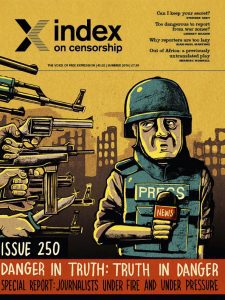
Index on Censorship’s summer magazine 2016
We’ll send you our weekly emails and periodic updates on our events. We won’t share your personal information with anyone outside Index.
You’ll also get access to an exclusive collection of articles from our landmark 250th issue of Index on Censorship magazine exploring journalists under fire and under pressure. Your downloadable PDF will include reports from Lindsey Hilsum, Laura Silvia Battaglia and Hazza Al-Adnan.[/vc_column_text][/vc_column][vc_column width=”1/2″][gravityform id=”20″ title=”false” description=”false” ajax=”false”][/vc_column][/vc_row][vc_row][vc_column][vc_separator color=”black”][/vc_column][/vc_row][vc_row][vc_column][vc_column_text]Uzbekistan
In Uzbekistan, the government imprisons individuals for not conforming to officially prescribed practices or whom it claims are extremist, including as many as 12,000 Muslims. A highly restrictive religion law is imposed, the 1998 Law on Freedom of Consciences and Religious Organisations, which severely limits the rights of all religious groups and facilitates Uzbek government control over religious activity. Many who don’t fit into the framework of officially approved practices are regularly repressed. Additionally, the government has continued a campaign against independent Muslims, targeting those linked to the May 2005 protests in Andijan; 231 are still imprisoned in connection to the events, and ten have died. All the while, Uzbekistan has pressured countries to return Uzbek refugees who fled during the Andijan tragedy.
Turkmenistan
In an environment of nearly inescapable government information control, severe religion freedom breaches persist in Turkmenistan. Continuing police raids and harassment of registered and unregistered religious groups matched with laws and policies that violate international human rights norms has the nation as one of the year’s biggest offenders. With an estimated total population of 5.1 million, the US government projects that the country is 85% Sunni Muslim, 9% Russian Orthodox, and a 2% total that includes Jehovah’s Witnesses, Jews, and evangelical Christians. Despite Turkmenistan’s constitutionally guaranteed religious freedom and separation of religion from the state, the 2003 religion law negates these provisions while setting intrusive registration criteria for individuals. It also requires that the government is informed of all foreign financial support, forbids worship in private homes and places discriminatory restrictions on religious education.
China
While the Chinese constitution guarantees freedom of religion, this idea really only applies to “normal religions”, better known as the five state-sanctioned “patriotic religious associations” associated with Buddhism, Taoism, Islam, Catholicism and Protestantism. Even still, the government monitors religious activities unfairly, and there has been an increased religious persecution of Uighur Muslims in the name of fighting terrorism. All around repression in China worsened in 2014, including the governmental push for controlling Tibet, Xinjiang, and even Hong Kong, as well as controls on the internet, social media, human rights defenders, activists and journalists.
Eritrea
Ongoing religious freedom abuses have continued in Eritrea, including torture or ill-treatment of religious prisoners, random arrests without charges and banning’s on public religious activities. The situation is especially serious for Evangelical and Pentecostal Christians and Jehovah’s Witnesses, and the government suppresses Muslim religious activities and those opposed to the government-appointed head of the community. In 2002, the government increased its control over religion by imposing a registration requirement on all religious groups other than the Coptic Orthodox Church of Eritrea, Sunni Islam, the Roman Catholic Church and the Evangelical Church of Eritrea. The requirements mandated that the non-preferred religious communities provide detailed information about their finances, membership, activities, and benefit to the country. Additionally, released religious prisoners have reported to USCIRF that they were confined in crowded conditions, and subjected to extreme temperature fluctuations. The government continued to arrest and detain followers of unregistered religious communities. Recent estimates suggest 1,200 to 3,000 people are imprisoned on religious grounds in Eritrea, the majority of whom are Evangelical or Pentecostal Christians.
Iran
Poor religious freedom in Iran continued to worsen in 2014, particularly for minority groups like Bahá’ís, Christian converts, and Sunni Muslims. The government is still engaging in systematic violations, including prolonged detention, torture, and executions based on the religion of the accused. Despite Christians, Jews, and Zoroastrians being recognised as protected minorities, the government has consistently discriminated against its citizens on the basis of religion. Killings, arrests, and physical abuse of detainees have increased in recent years, including for religious minorities and Muslims who are perceived as threatening the government’s legitimacy.[/vc_column_text][/vc_column][/vc_row][vc_row][vc_column][vc_basic_grid post_type=”post” max_items=”12″ style=”load-more” items_per_page=”4″ element_width=”6″ grid_id=”vc_gid:1493906845781-a7b9ac80-f77d-2″ taxonomies=”1742″][/vc_column][/vc_row]
27 Nov 2015 | Campaigns, Middle East and North Africa, mobile, Palestine, Statements
We, the undersigned organisations, all dedicated to the value of creative freedom, are writing to express our grave concern that Ashraf Fayadh has been sentenced to death for apostasy.
Ashraf Fayadh, a poet, artist, curator, and member of British-Saudi art organisation Edge of Arabia, was first detained in August 2013 in relation to his collection of poems Instructions Within following the submission of a complaint to the Saudi Committee for the Promotion of Virtue. He was released on bail but rearrested in January 2014.
According to court documents, in May 2014 the General Court of Abha found proof that Fayadh had committed apostasy (ridda) but had repented for it. The charge of apostasy was dropped, but he was nevertheless sentenced to four years in prison and 800 lashes in relation to numerous charges related to blasphemy.
At Ashraf Fayadh’s retrial in November 2015 the judge reversed the previous ruling, declaring that repentance was not enough to avoid the death penalty. We believe that all charges against him should have been dropped entirely, and are appalled that Fayadh has instead been sentenced to death for apostasy, simply for exercising his rights to freedom of expression and freedom of belief.
As a member of the UN Human Rights Council (HRC), the pre-eminent intergovernmental body tasked with protecting and promoting human rights, and the Chair of the HRC’s Consultative Group, Saudi Arabia purports to uphold and respect the highest standards of human rights. However, the decision of the court is a clear violation of the internationally recognised rights to freedom of conscience and expression. Article 18 of the Universal Declaration of Human Rights (UDHR) states that, “[e]veryone has the right to freedom of thought, conscience and religion; this right includes freedom to change his religion or belief”. Furthermore, under Article 19 of the Universal Declaration of Human Rights, “everyone has the right to freedom of opinion and expression; this right includes freedom to hold opinions without interference and to seek, receive and impart information and ideas through any media and regardless of frontiers”. Saudi Arabia is therefore in absolute contravention of the rights that as a member of the UN HRC it has committed to protect.
There are also widespread concerns over an apparent lack of due process in the trial: Fayadh was denied legal representation, reportedly as a result of his ID having been confiscated following his arrest in January 2014. It is our understanding that Fayadh has 30 days to appeal this latest ruling, and we urge the authorities to allow him access to the lawyer of his choice.
We call on the Saudi authorities to release Ashraf Fayadh and others detained in Saudi Arabia in violation of their right to freedom of expression immediately and unconditionally.
List of signatories:
AICA (International Association of Art Critics)
Algerian PEN
All-India PEN
Amnesty International UK
Arterial Network
ARTICLE 19
Artists for Palestine UK
Austrian PEN
Banipal
Bangladesh PEN
Bread and Roses TV
British Humanist Association
Bulgarian PEN
Centre for Secular Space
CIMAM (International Committee for Museums and Collections of Modern Art)
Council of Ex-Muslims of Britain
Croatian PEN
Crossway Foundation
Danish PEN
English PEN
Ethiopian PEN-in-Exile
FIDH (International Federation for Human Rights)
Five Leaves Publications
Freemuse
German PEN
Haitian PEN
Human Rights Watch
Index on Censorship
International Humanist and Ethical Union
Iranian PEN in Exile
Jimmy Wales Foundation
Lebanese PEN
Ledbury Poetry Festival
Lithuanian PEN
Modern Poetry in Translation
National Coalition Against Censorship (NCAC)
Norwegian PEN
One Darnley Road
One Law for All
Palestinian PEN
PEN American Center
PEN Canada
PEN International
PEN South Africa
Peruvian PEN
Peter Tatchell Foundation
Portuguese PEN
Québec PEN
Russian PEN
San Miguel PEN
Scottish PEN
Slovene PEN
Society of Authors
South African PEN
Split This Rock
Suisse Romand PEN
School of Literature, Drama and Creative Writing, University of East Anglia
The Voice Project
Trieste PEN
Turkish PEN
Wales PEN Cymru














